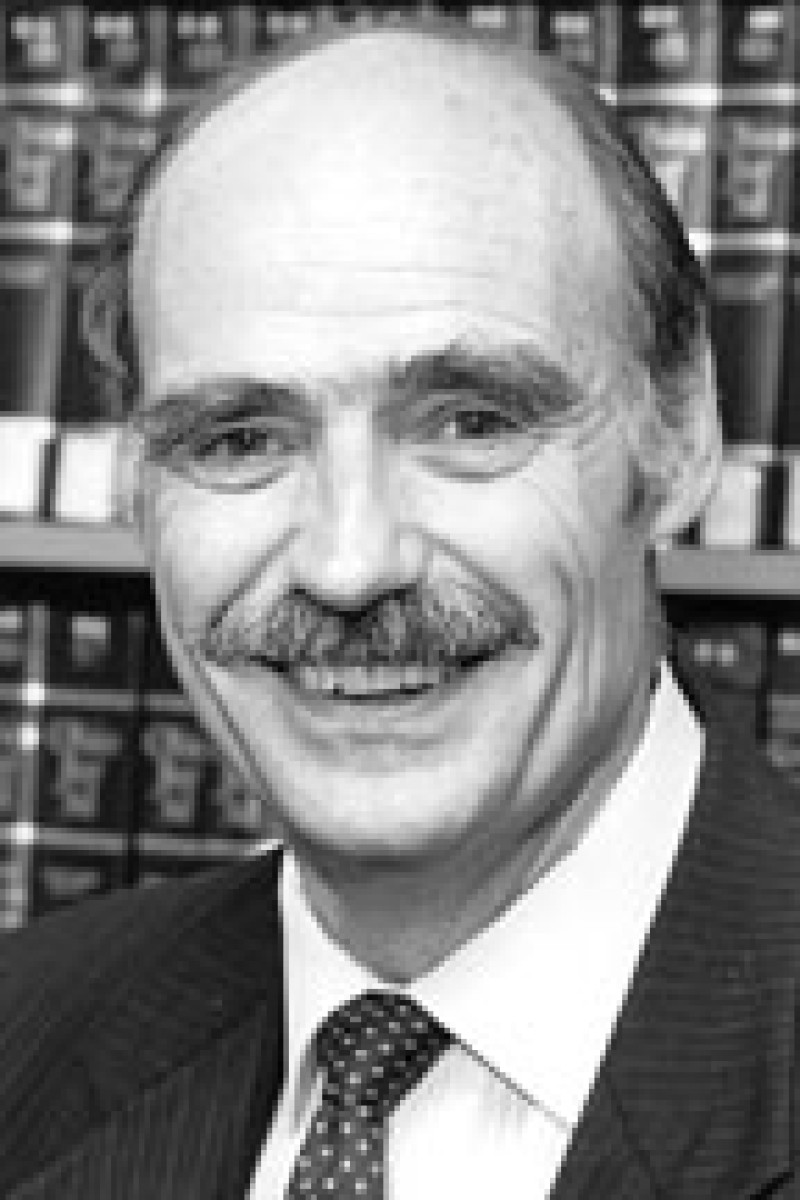Herbert Russell Brown
Herbert Russell Brown once described his career on the Supreme Court of Ohio as the “most interesting, rewarding and challenging job I’ve had in my life.”
Born in 1931 in Columbus to Thomas Newton and Irene Hankinson Brown, he attended Denison University and graduated in 1953, with a bachelor’s degree. In 1956, Brown earned his law degree from the University of Michigan, where he was Phi Alpha Delta and served on the Law Review from 1955 to 1956.
After graduation, Brown joined the firm of Vorys, Sater, Seymour & Pease as associate attorney for a short period before entering the military. He served in the Army Judge Advocates General office from 1957 to 1959, entering as a first lieutenant and reaching captain in 1959, while serving in the Defense Appellate Division of the Pentagon. In 1959, Brown was awarded the Commendation Medal and the Ribbon Medal pendant. In 1960, Brown returned to Vorys, where he spent the next four years serving as an arbitrator in complex litigation cases. In 1965, he became a partner, but left the firm in 1982 to devote time to his writing.
In his first foray into public life, Brown was defeated in his bid for the 58th district of the Ohio House of Representatives. From 1967 to 1968, he served as a Federal Lands Commissioner and, beginning in 1981, as a Lake Lands Commissioner.
In addition to his legal activities with Vorys, Brown served as an examiner with the Ohio State Bar from 1962 to 1972, the District Court Bar from 1968 to 1971 and the Multi-State Bar from 1971-1976.
In 1986, Brown entered the Democratic primary for the Supreme Court of Ohio against John Connor and Donald R. Ford as the “dark horse in a three way race.” Running without party support, he won the general election for the position vacated by Clifford F. Brown because of strong support of the Ohio AFL-CIO.
Brown was thought by colleagues to be a capable Justice who served with integrity and impartiality. In 1992, Brown authored the opinion declaring Ohio’s ethnic intimidation law unconstitutional. He stated: “We express our abhorrence for racial and ethnic hatred, and especially for crimes motivated by such hatred. We fully accept the premise that prompted the enactment of the legislation before us: that bigotry, whether expressed merely in words or by violence, does harm to its victims and to society as a whole. The ethnic intimidation statute is a well-intentioned response to a society-threatening problem.” That law allowed juries to impose stiffer sentences when they felt such crimes as menacing or endangering were committed “by reason of the race, color, religion or national origin of another person or group of persons.” Brown interpreted that as criminalizing thought, which he believed unconstitutional and wrote, “Enhancing a penalty because of motive therefore punishes the person’s thought, rather than the person’s act or criminal intent.”
In 1991, after many rejected manuscripts, Brown found a publisher for his novel “Presumption of Guilt.” It met with some success and Brown decided to return to a life of writing. In making the decision not to run for re-election, Brown stated, “I’ve had a long-standing, 17 year interest in writing fiction. I’m now in that game, having published. I look at a [Supreme Court] term which would end when I am 67, and who knows how much energy you have at that point.”
Brown continued to write, publishing the book “Shadows of Doubt” in 1994, and several plays including “Power of God” in 2002, which won a competition and was produced by the Contemporary American Theatre Company in Columbus. Brown later wrote his first full-length play, “You’re My Boy,” about the relationship between Richard Nixon and Dwight Eisenhower. Other works include “Peace with Honor” and “Mano a Mano.” In addition to writing, Brown has taught as an adjutant professor at The Ohio State University College of Law since 1997.
Brown married Beverly Ann Jenkins in 1967. They have two sons: David Herbert Brown and Andrew Jenkins Brown.

b. 1931
142nd Justice of the Supreme Court of Ohio
TERM
Jan 1, 1987
to Jan 1, 1993
